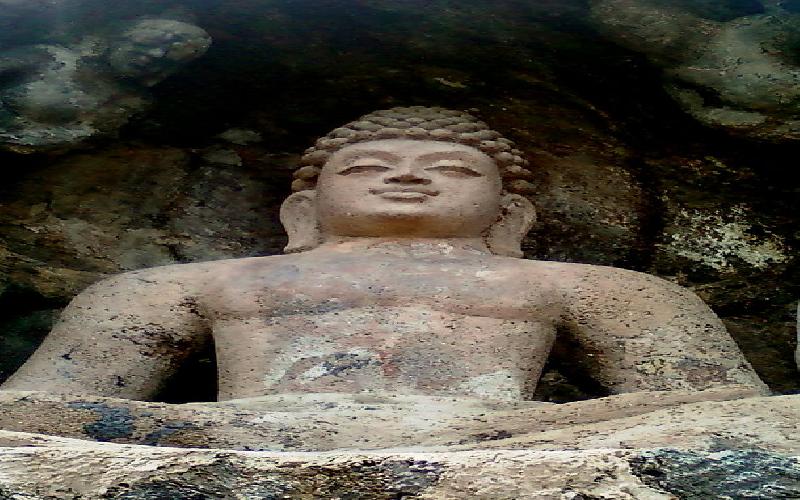Modern historians tend to ignore that Gautam Buddha, the proponent of Buddhism, was a Hindu philosopher revered by Hindus and followed by them. Their fallacies result from the lack of their awareness that Buddhism was one of the many philosophical schools of ancient India that were together a part and parcel of Indian religious philosophies, which were in nature of commentaries and explanation of ‘Dharma’ (meaning duties). Thus, modern history of India, written by Western scholars on the basis of their own perception of religion as it is understood in the West, creates a divide between Hinduism and Buddhism, as two different religions, without understanding that these philosophies of ‘Dharma’ are not religions like Islam and Christianity. An understanding of Hinduism and its essential character as a faculty of many variations of spiritual philosophies is essential to appreciate the role of Gautam Buddha in Hinduism.
Gautam Buddha in Hinduism
Gautam Buddha and his teachings and philosophy have had an enormous impact on not only the evolution of Hinduism, but also the medieval as well as the modern Indian society.
In Hinduism, Buddha is considered the ninth incarnation of Vishnu, the form of almighty god that preserves life and universe. While Buddhism thrived and prospered in countries outside India as an independent entity, within India, Buddhism does not seem to be a very popular religion, nor is Buddha one of the primary deities in most Hindu temples. It is an irony that is probably the main reason for Buddhism being considered as a totally different religion from Hinduism.
To solve this riddle, one needs to run through a few millennia of history and culture of India. However, even before that, one needs to understand what is meant by Hinduism.
Understanding Hinduism & Role of Buddha
The word Hinduism is not indicative of a particular religion in the way the term ‘religion’ is understood in the West – as a divine gospel or diktat, that humans can only understand, not contribute to. In ancient India, the equivalent word for religion was DHARMA, meaning duty, wherein the primary focus was on the conduct and the duty of a person in the social context. The divine texts or VEDAs were certainly there, but more important was the conduct of a person. The almighty god was defined as an omnipotent, omnipresent entity, that neither begins nor ends and that is beyond human understanding, though we can feel him in a spiritual way.
The almighty god in Sanatan Dharma (the name by which Hinduism used to be called in ancient times) was worshipped both as a formless entity, and in different forms- mostly human. The three major forms were BRAHMA, the form which is the creator of universe; VISHNU, the preserver; and SHIVA, the form in which Lord destroys the old to make way for the new. Vishnu is said to have come to our world in a mortal form nine times till date, to save the living world, guide the humans, and destroy the evil. The ninth such incarnation was Gautam Buddha.
Here again it is important to appreciate that in ancient India, Dharma had the primary focus on duty and conduct, and since it was not restricted as a divine diktat, several schools of thought and philosophy with subtle differences existed simultaneously, and each one of them was respected, though some of them used to be more popular than others at any given point of time. There was a tradition of debate and discussion, wherein experts from different schools used to come at a platform and prove a point or two. It was in this background that Buddha started preaching his philosophy.
Gautam Buddha’s Life & Philosophy
Gautam Buddha was born as SIDDHARTHA, a prince in a small kingdom in Northern India. After his birth, an astrologer told his father, the king, that the boy will either become a great king or else he will denounce the world and become a great saint. The king did not want his son to become an ascetic, so he attempted to ensure that Siddhartha was always surrounded by worldly pleasures and luxuries. Nothing pitiful, nor anything that would have raised compassion in the mind of the young prince or encouraged detachment from worldly affairs was ever allowed to come close to him.
Unfortunately, such isolation from pain and suffering only made him extraordinarily sensitive to it. It is said that the grown up prince once asked his charioteer to take him to the city. On the way, he met a person who was very sick. Siddhartha did not understand what was happening to this person, and was very surprised to know that people fell so sick. Next he saw a person who was very old. The prince was surprised and asked what disease he suffered. When told that it was not a disease, but the destiny of every person, he was even more deeply perturbed. Finally, he came across a funeral procession, and asked what was happening. When told that a person had died, he enquired about death. He was told that every person dies, and so would all his relatives and friend. Ever since that moment, Siddhartha realized that everything in life is temporary, and started wondering whether it is worth all the suffering that the mankind has to endure.
After he had been married, and blessed with a child, Siddhartha left his palace one night, and went away from his family, to learn more about life and destiny, so as to find a way to redress human suffering. He spent many years in the company of learned saints and philosophers. He also undertook rigorous meditation and yoga on the Himalayas. However, he was not satisfied with what
he learnt. Finally, one morning, under the Bodhi tree in the city of GAYA, he attained self-actualization. Thereafter, he started preaching his understanding. He prescribed the middle path – the path between the two extremes of religious fanaticism and totally self-centred materialistic life-style. He used to preach in local language, unlike other scholars who used Sanskrit – the language of scholars, which unfortunately, most ordinary people did not understood very well. In many other ways too, Buddha differed from the prevalent schools of philosophy in India. He did not give any significance to the class differentiation. He preached non violence, and giving up all greed, lust and attachments, as a means to attain peace and reduce one’s own suffering.Buddhism & Other Schools of Hindu Philosophy
Budha devised simple solutions for problem of human suffering. Primary among them was the detachment to all worldly affairs and articles, and leading a simple life with ordinary means. He never declared himself as an incarnation of god, nor did he gave any name to his followers. With time, his followers became almost a sect within Hinduism. Many kings gave patronage to Buddhist school of philosophy, which was very much a part of Hindu mainstream, even though it differed with some of the tenets of ‘Sanatana Dharma’ – the traditional faith. One of the most famous example of royal patronage to Buddism is Emperor Ashoka, often considered the greatest emperors of ancient India, who gave up all violence under the influence of his Buddhist teacher, and sent his children to Sri Lanka and Myamnar. Incidentally, Ashoka’s father BIMBISAR was a patron of Sanatana Dharma, the traditional school, while his grandfather CHANDRAGUPTA MAURYA was a patron of JAINISM, another popular school of philosophy during those times that still survives in India, but is considered an integral part of Hinduism.
In the first thousand years after Christ, Buddhism and Jainism were the dominant schools of philosophy in India, till the ADI SANKARACHARYA, a brilliant scholar and proponent of ancient Sanatana Dharma again took the lead and re-established Sanatan dharma and primacy of Vedas in Hinduism as the dominant schools, in eighth century A.D. During the period between Buddha and the Sankaracharya, Buddhist schools had been dominant, and had reshaped Hinduism as per their own principles. Notably, in India, Buddhism was never a separate religion from Hinduism. It was, in fact, the dominant school of philosophy within Hinduism. Thus, during this period, non-violence was established deep in the Hindu psyche. Killing and wars were disliked – a phenomenon that some claim as a factor for subsequent submission of Indian armies before the foreign invaders.
By tenth century, India had become the primary target of Muslim invaders in the middle ages. It was India’s wealth that they wanted, but when they invaded, they destroyed everything related to its religion too. In the process, they destroyed the libraries of TAKSHASHILA in the West, and NALANDA in the East, which were the primary reservoirs of all ancient Indian knowledge and scriptures. The last of them in Nalanda were handed over to the Tibetan students by the teachers of Nalanda so that they can be preserved. Thus, more scriptures of Buddhism are probably preserved in Tibet than in India today. Interestingly, some of these ancient scriptures, were subsequently sent to China under the influence of spreading Buddhism, and many such scriptures are hidden even today in the forbidden city of Beijing in the joints and domes of the main buildings.
Hinduism & Buddhism in India
In India, Buddhism was never identified as a religion separate from Hinduism. Till the eighth century A.D. it was the dominant school of philosophy within Hinduism. After Sankaracharya established his philosophy, ADVAITAVAD or the philosophy of unitary existence of god and soul in the eighth century A.D., Buddhism lost its dominance within Hinduism but its tenets remained an integral part of Hinduism, having become fully merged in it.
In the foreign countries, Buddhist philosophy was taught, and Buddha was treated as god. There, other forms of incarnations like Krishna began to be considered an earlier incarnation of Buddha, instead of being considered as incarnations of Vishnu. Thus, outside India, Buddhism came to have an identity that was considered different from Hinduism, even though there, Buddhism was deeply influenced by different schools of philosophy in Hinduism. With time, the two streams of Buddhism outside India and Hinduism within it began to diverge, being aided by local customs, different languages and changing times. Once power in India was captured by Muslim emperors, the evolution and further development of Hinduism as well as Buddhism was thwarted. During the next thousand years, Dharma became Hinduism – largely as a result of separation of identity from Islam. In this faith called Hinduism, Buddhist philosophies of non-violence, middle path and detachment were deeply embedded, but somewhere along, Buddhist scriptures were lost. So was the emphasis on Buddha as a deity.










